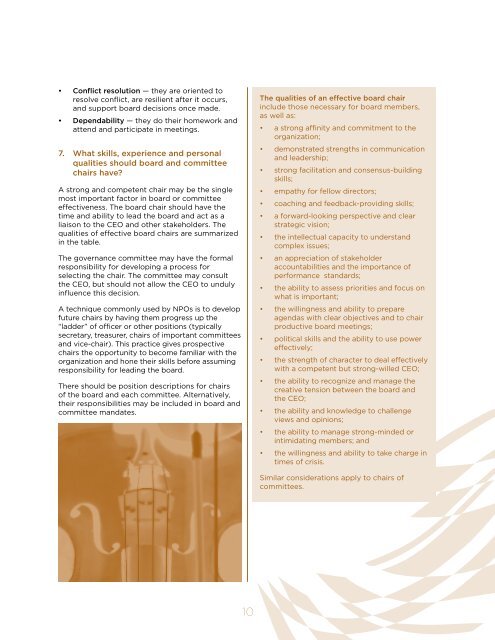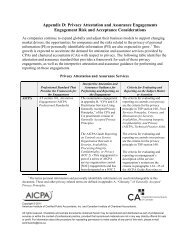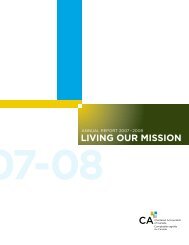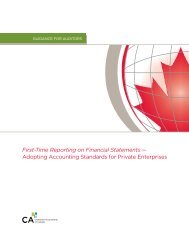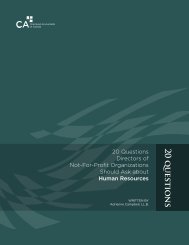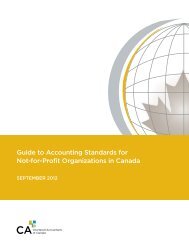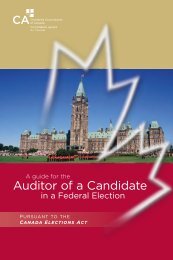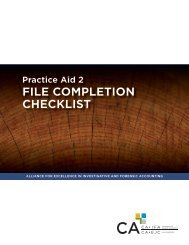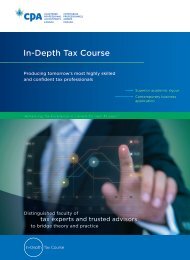20 Questions Directors of Not-for-Profit Organizations Should Ask ...
20 Questions Directors of Not-for-Profit Organizations Should Ask ...
20 Questions Directors of Not-for-Profit Organizations Should Ask ...
You also want an ePaper? Increase the reach of your titles
YUMPU automatically turns print PDFs into web optimized ePapers that Google loves.
• Conflict resolution — they are oriented to<br />
resolve conflict, are resilient after it occurs,<br />
and support board decisions once made.<br />
• Dependability — they do their homework and<br />
attend and participate in meetings.<br />
7.<br />
What skills, experience and personal<br />
qualities should board and committee<br />
chairs have<br />
A strong and competent chair may be the single<br />
most important factor in board or committee<br />
effectiveness. The board chair should have the<br />
time and ability to lead the board and act as a<br />
liaison to the CEO and other stakeholders. The<br />
qualities <strong>of</strong> effective board chairs are summarized<br />
in the table.<br />
The governance committee may have the <strong>for</strong>mal<br />
responsibility <strong>for</strong> developing a process <strong>for</strong><br />
selecting the chair. The committee may consult<br />
the CEO, but should not allow the CEO to unduly<br />
influence this decision.<br />
A technique commonly used by NPOs is to develop<br />
future chairs by having them progress up the<br />
“ladder” <strong>of</strong> <strong>of</strong>ficer or other positions (typically<br />
secretary, treasurer, chairs <strong>of</strong> important committees<br />
and vice-chair). This practice gives prospective<br />
chairs the opportunity to become familiar with the<br />
organization and hone their skills be<strong>for</strong>e assuming<br />
responsibility <strong>for</strong> leading the board.<br />
There should be position descriptions <strong>for</strong> chairs<br />
<strong>of</strong> the board and each committee. Alternatively,<br />
their responsibilities may be included in board and<br />
committee mandates.<br />
The qualities <strong>of</strong> an effective board chair<br />
include those necessary <strong>for</strong> board members,<br />
as well as:<br />
• a strong affinity and commitment to the<br />
organization;<br />
• demonstrated strengths in communication<br />
and leadership;<br />
• strong facilitation and consensus-building<br />
skills;<br />
• empathy <strong>for</strong> fellow directors;<br />
• coaching and feedback-providing skills;<br />
• a <strong>for</strong>ward-looking perspective and clear<br />
strategic vision;<br />
• the intellectual capacity to understand<br />
complex issues;<br />
• an appreciation <strong>of</strong> stakeholder<br />
accountabilities and the importance <strong>of</strong><br />
per<strong>for</strong>mance standards;<br />
• the ability to assess priorities and focus on<br />
what is important;<br />
• the willingness and ability to prepare<br />
agendas with clear objectives and to chair<br />
productive board meetings;<br />
• political skills and the ability to use power<br />
effectively;<br />
• the strength <strong>of</strong> character to deal effectively<br />
with a competent but strong-willed CEO;<br />
• the ability to recognize and manage the<br />
creative tension between the board and<br />
the CEO;<br />
• the ability and knowledge to challenge<br />
views and opinions;<br />
• the ability to manage strong-minded or<br />
intimidating members; and<br />
• the willingness and ability to take charge in<br />
times <strong>of</strong> crisis.<br />
Similar considerations apply to chairs <strong>of</strong><br />
committees.<br />
10


